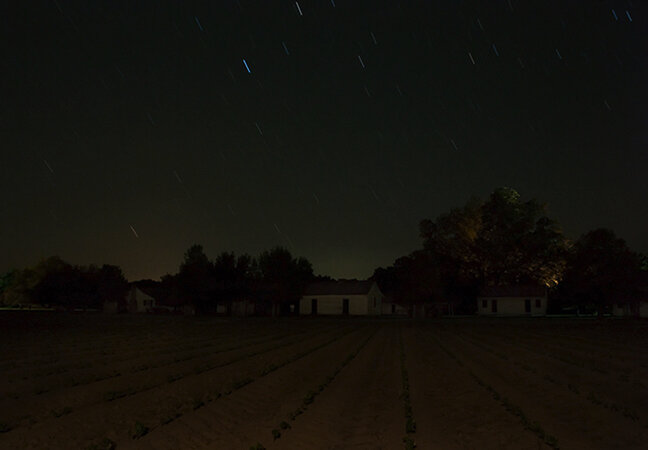JEANINE MICHNA-BALES
Through Darkness to Light:
Photographs Along the Underground Railroad
Artist Statement
From a cotton plantation just South of Natchitoches, Louisiana all the way north to Canada, this series of photographs helps us imagine what the long road from slavery to freedom may have looked like as seen through the eyes of one of those who made this epic journey, circa 1840.
They left during the middle of the night — often carrying little more than the knowledge that moss grows on the north side of trees. An estimated 100,000 American slaves between 1800 and the end of The Civil War in 1865 chose to embark on this journey of untold hardships in search of freedom. They moved in constant fear of being killed outright or recaptured then returned and beaten as an example of what would happen to others who might choose to run. Under the cover of darkness, ‘fugitives’ traveled roughly 20 miles each night traversing rugged terrain while enduring all the hardships that Mother Nature could bring to bear. Occasionally, they were guided from one secret, safe location to the next by an ever-changing, clandestine group known as the Underground Railroad. Whether they were slaves trying to escape or free blacks and whites trying to help, both sides risked everything for the cause of freedom.
Photographer Jeanine Michna-Bales spent over a decade meticulously researching ‘fugitive’ slaves and the ways they escaped to freedom. Due to the secrecy surrounding the Underground Railroad, research on the topic is still coming to light. The unnumbered routes of the Railroad encompassed countless square miles. The path Michna-Bales documented encompasses roughly 2,000 miles—starting in Louisiana, crossing through seven states and ending in Canada. It is based off actual sites, cities and places that freedom-seekers passed through during their journey to freedom. The images from the series were captured over a three-year period and are currently being printed in a trade book published by Princeton Architectural Press and will be released February 7, 2017.
Many books have been written over the years on the subject, but because of its secretive nature, there is very little visual documentation of the Underground Railroad. The goal of this project is to provide a sense of what it would be like to take this journey out of bondage; to run in fear for roughly three months with very little help along the way, seeking that fundamental human right of freedom. In today’s America, as we become more and more diverse and cross-cultural, Michna-Bales believes that an appreciation and understanding of the experience—and those who lived through it—is more relevant than ever. The Underground Railroad united people from different races, genders, social levels, religions and regions in a common and worthwhile cause. It was the first Civil Rights Movement within America. Michna-Bales hopes the project makes people want to learn more, ask questions and open a dialogue on the subject, and in the end, provide a better understanding of where we all came from.



